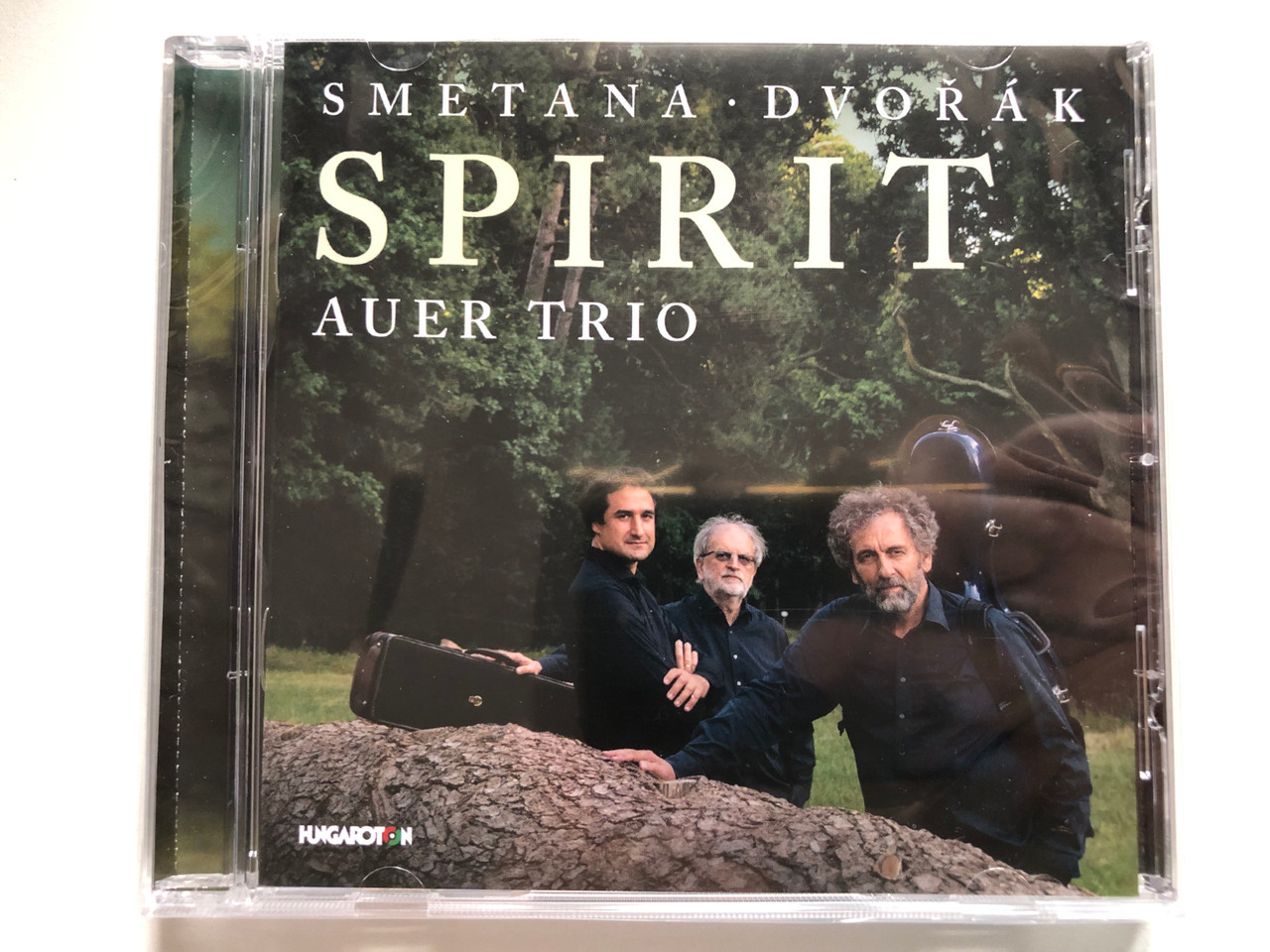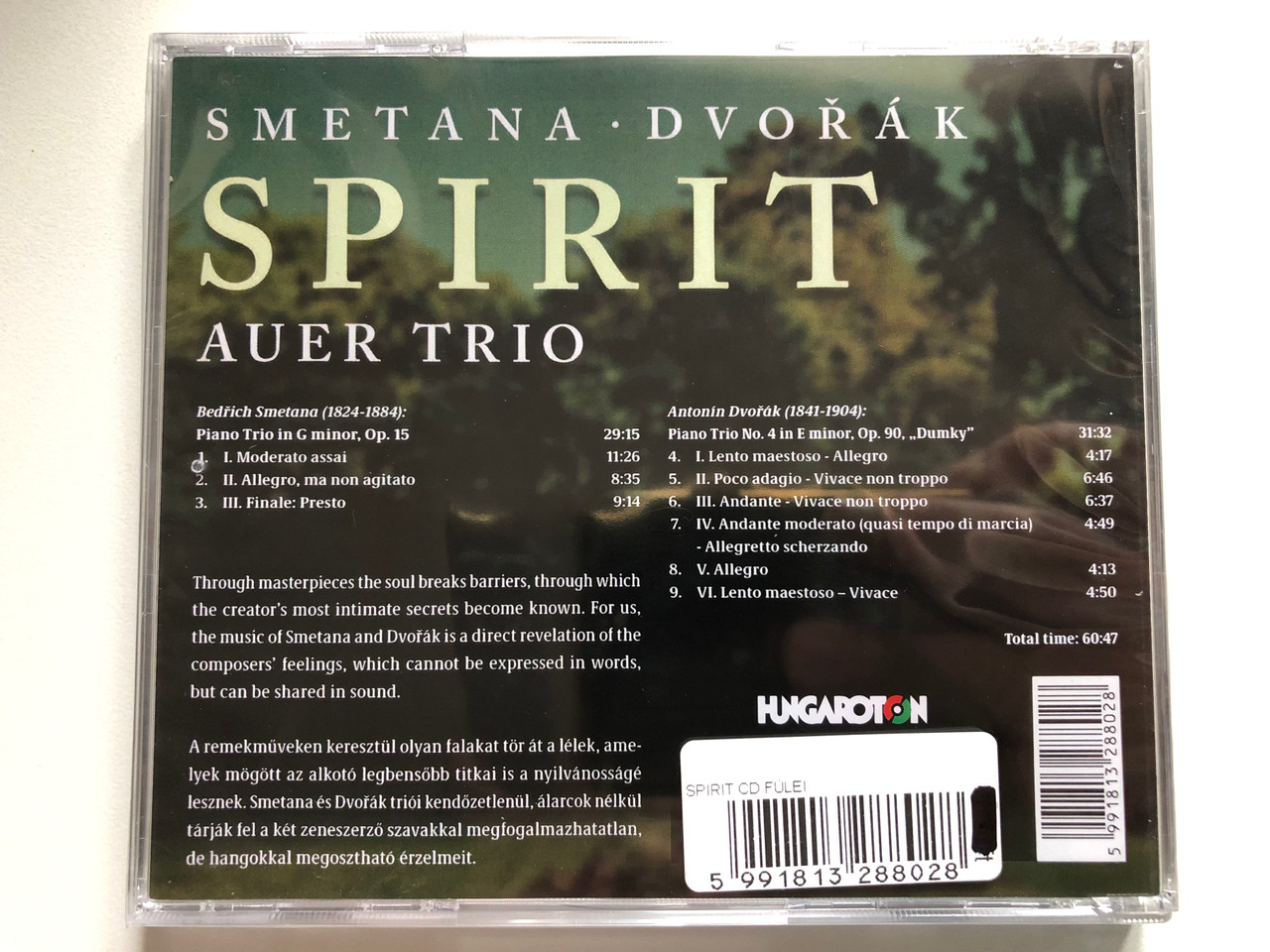Description
Smetana, Dvorak: Spirit - Auer Trio / Hungaroton Audio CD 2023 / HCD 32880
UPC 5991813288028
Made in EU
Auer Trió:
Péter Kováts - violin
István Varga - violoncello
Balázs Fülei - piano
Through masterpieces the soul breaks barriers, through which the creator’s most intimate secrets become known. For us, the music of Smetana and Dvořák is a direct revelation of the composers’ feelings, which cannot be expressed in words, but can be shared in sound.
Recorded on 3–4 and 17–18 June, 2023 at Rottenbiller Studio.
Cover photo: Gábor Déber
Tracklist:
Bedrich Smetana (1824-1884): Piano Trio in G minor, Op. 15
1. I. Moderato assai 11:26
2. II. Allegro, ma non agitato 8:35
3. III. Finale: Presto 9:14
Antonio Dvorak (1841-1904): Piano Trio No. 4 in E minor, Op. 90 'Dumky' 31:32
4. I. Lento maestoso - Allegro 4:17
5. II. Poco adagio - Vivace non troppo 6:46
6. III. Andante - Vivace non troppo 6:37
7. IV. Andante moderato (quasi tempo di marcia) - Allegretto scherzando 4:49
8. V. Allegro 4:13
9. VI. Lento maestoso - Vivace 4:50
Spirit, the brand new Auer Trio album is out now! To know more about the inspiration behind the record, here are a few words about it by Balázs Fülei:
The music of Smetana and Dvořák reveals the unmasked emotions of the two composers, which are inexpressible in words but can be shared in sound. These works are exceptional, because they give us a great deal of scope for performance. Both composers essentially call the performers co-composers. While the instructions and entries are clear and guiding, at the same time, they do not impose a task to be fulfilled on the performer, but rather define a starting point of freedom.
This recording contains piano trios by the
two most important Czech composers of
the nineteenth century. What makes these
works especially interesting is that they
give a lot of room for manoeuvre for a good
performance: both composers essentially
call on the performers to be fellow-artists.
The instructions and indications are clear
and provide guidelines, but rather than
give the performers a task to fulfil, they
define the starting point for freedom.
Bedřich Smetana’s Trio in G minor (op. 15)
is a large-scale work in three movements,
full of extremes and tumultuous emotions.
All three instruments often have an
independent role. In the very first bars, we
hear the solitary cry of the violin, and the
faltering motifs sweep us into an energetic
shared theme. The cello also has special
role: in the subsidiary theme it provides the
emotional counterpart to the violin subject
– the voice of desperation is replaced by
that of assurance. The piano too has a
separate interlude during the movement,
and relinquishing the symphonic sound, it
adds a personal commentary to the piece.
The first movement is full of fragmented
ideas, full of questions. The second
movement is a fleeting scherzo with two
important trios. The first, paints a cheery
picture, reminiscing over the past, with
the main roles being played by the violin
and cello. The second trio contains the
agonizing of the present: Smetana lost
his first-born daughter, Bedřiska, when
she was four-and-a-half years old. The
harsh, dotted rhythms conjure up a
funeral march, in which the sound of
hope and consolation can be heard, like
sunbeams piercing the dense clouds. The
third movement of the G minor trio is a
quick tarantella, in several variations. The
melody of the subsidiary theme sounds
on all three instruments, sometimes in
quite a jazzy, improvisatory style, and it
soon transpires that this motif, suggesting
resignation and surrender, returns in
triumph at the end of the movement. The
piece was premiered on 3 December 1855.
Later, during his time in Gothenburg, the
composer revised it, and the work as it is
currently published was first performed on
11 February 1858. Smetana was at the piano
in both concerts, and he was so attached to
the work that it was performed also at his
last chamber music concert, on 24 January
1883, when Smetana was already deaf.
Antonín Dvořák’s Op. 90 Trio in E minor,
the “Dumky Trio”, was first heard in
April 1891 at the gala evening held at the
University of Prague on the occasion of
Dvořák’s honorary doctorate, with the
composer himself at the piano. From
the sixteenth century the word dumka
was used to describe Ukrainian laments,
but later it referred to epic Slavonic
heroic poems.
...


























